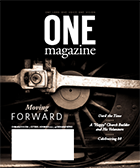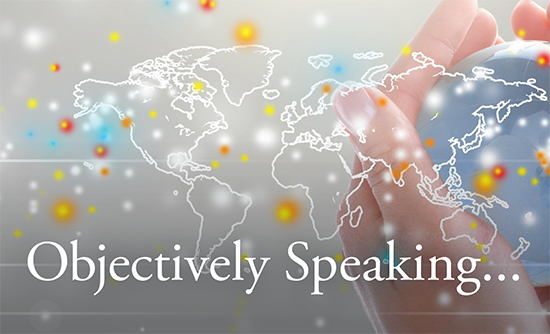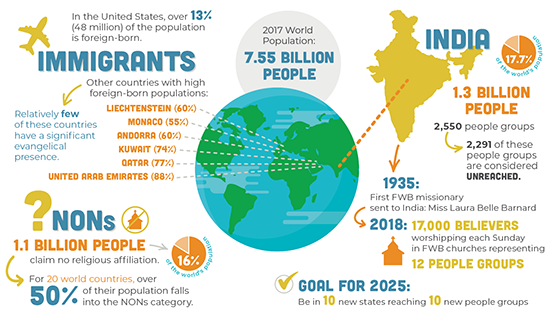
October-
November 2018
Moving Forward
------------------
|






Objectively Speaking
By Clint Morgan
Each year, the IM leadership team spends several days offsite discussing our organizational strategic objectives. We call this meeting Labor Camp, and with good reason. The team engages in extensive times of prayer, discussion, dialogue, and even a speck of debate at times.
The leadership team walked away from Labor Camp 2017 with four major strategic objectives. Approved by the IM board at the December 2017 meeting, they are:
-
Broaden the Free Will Baptist footprint
in India.
-
Adopt and reach the NONs as a “hidden
people group.”
-
Develop teams to reach immigrants
and refugees.
-
Form more international teams.
As you read more about these four objectives, will you prayerfully consider your role in bringing them to
fruition?
Broaden the Free Will Baptist Footprint in India
India is our oldest field. Miss Laura Belle Barnard, the first “foreign” missionary of the newly formed National Association of Free Will Baptists, was sent to India in 1935. With just a few dollars in her purse, and a burning passion to reach India’s people, she pioneered our first work. Now our largest Free Will Baptist presence outside the United States, over 17,000 believers worship each Sunday in Free Will Baptist churches in three of India’s 29 states. These churches serve 12 people groups.

However, the remaining task is overwhelming, and will never be accomplished if believers do not commit to reaching the massive block of lost people living there.
India’s population exceeds 1.3 billion people divided into 2,550 people groups. Of these, 2,291 people groups—a whopping 95% of the population—are considered Unreached People Groups (UPGs). UPGs are defined as less than 2% evangelical Christian. Fully one-third of these people groups (715), are identified as unengaged, unreached people groups. No missionaries share the gospel with them. No known Christians reside among them. They have no perceptible evangelical activity of any kind.
We will work to broaden our footprint by:
-
Working with existing FWB churches and our FWB partner, The Friends of India;
-
Partnering with other evangelical organizations, indigenous or international, already working in India to reach UPGs;
-
Sponsoring missionary teams using creative means to target new areas;
-
Engaging The Hanna Project (THP) to provide support for the three methods above.
By the year 2025—a scant seven years from now—we desire to be in ten new states reaching ten new people groups. We believe this is a promising time to assume an offensive posture for such an enormous undertaking.
Adopt the NONs as a Hidden People Group
NONs include atheists, agnostics, and all others who do not identify with any particular religion. In 2017, 1.1 billion of the earth’s population considered themselves without religious affiliation. That represents 16% of the people in the world. An astounding 88% of NONs state they are not looking for a religion to follow.
Hidden people group (HPG) is often used synonymously with unreached people group (UPG). However, we intentionally use HPG to emphasize the uniqueness of the NONs. Although similar in their characteristics as it relates to their views of God, religion, sacred writings, and much more, the NONs do not fit snuggly in the category of an UPG.
One of the more pronounced differences is they lack a central religion that identifies them. Often hidden under layers of religiosity, they have no fundamental belief in, nor concern with, a God like the One in the Bible.
Several European countries present solid examples of people who claim to be part of a church, but gladly state they have no religious affiliation. They identify with the church only as it relates to confirmation, marriage, and burying. In their day-to-day existence, neither the church nor any religion imposes a particular belief or behavior on them. More than 50% of the population of 20 countries fits into the category of NONs.
Most of these countries are relatively open to Christians preaching the gospel to their people. This alone should serve as a clarion call to true believers to take the truth to this HPG. This group of 1.1 billion is too large to ignore. At IM, we are committed to pursuing the task of getting the gospel to those who, at this point in time, seemingly have no desire to pursue a personal relationship with the true and living God.
Develop Teams to Reach Immigrants and Refugees
As wars rage, economies fail, natural disasters strike, political instability rises, and persecution intensifies, we can expect the number of immigrants and refugees to increase. In the United States alone, over 48 million foreign-born people reside. This amounts to a bit over 13% of our total population. This number is matched or surpassed in many other countries.
In several nations in the Middle East and Europe, immigrants and refugees make up more than 55% of the population. Not one of these countries has a significant evangelical presence. Does this not challenge us to consider God’s call to a country so unmistakably in need of the gospel?
Is it not reasonable to think immigrants and refugees should find their contacts with believers comforting, refreshing, and hopeful? After all, they are in a life-changing transition—a new land, language, culture, and, in many cases, a new understanding of God. Their interactions with Christ-followers should lead them to hear of and hopefully receive Him as their Savior. We should reach out to them, meet their needs when possible, and share Christ—even if they are resistant and do not receive Him. Simply put, it is the right thing to do.
To please God in this matter, we must ensure our strategies and actions reflect His desire that all nations come to know Him. Therefore, we will establish teams with a focus of taking the Good News to the immigrants and refugees to whom God directs us.
Form More International Teams
On the international stage, a great shift of Christianity from the West (the U.S. and Europe) to the Global South (South America and Africa) has occurred. Many of the countries that used to receive missionaries are now almost void of a missionary presence. This is certainly true of our works.
We have important, long-term investments on several former mission fields. We have no desire to abandon these fields. Instead, we desire to exercise our core value of interdependence in our relationship with these national churches.
In many of these countries, vibrant national churches demonstrate a clear-cut, unmistakable understanding they, too, have an Acts 1:8 responsibility. This pushes them to consider where God wants them to work to expand His Kingdom.
As we see our national churches grasp the implications of this verse and send out missionaries, we are excited to join them in reaching the least-reached places.
Since the IM leadership team first addressed this possibility as a strategic initiative in 2012, we have seen our field and stateside ministries expand to include international believers. These examples show we have embraced the concept: Trifonovs and Radi (now deceased) in Bulgaria; Riesgos in the States; Manu and Noemí serving in Spain; and collaborative efforts with the Cuban national church to send missionaries to Côte d’Ivoire and Uruguay.
The question now is: will we as Free Will Baptists carry out these strategies? This must be an effort by the entirety of the denomination. We pray God will call out from His people those who are willing to labor together to fulfill the Great Commission.
About the Writer: Clint Morgan has been general director of
International Missions since 2011. Learn more: www.fwbgo.com.
|
|

